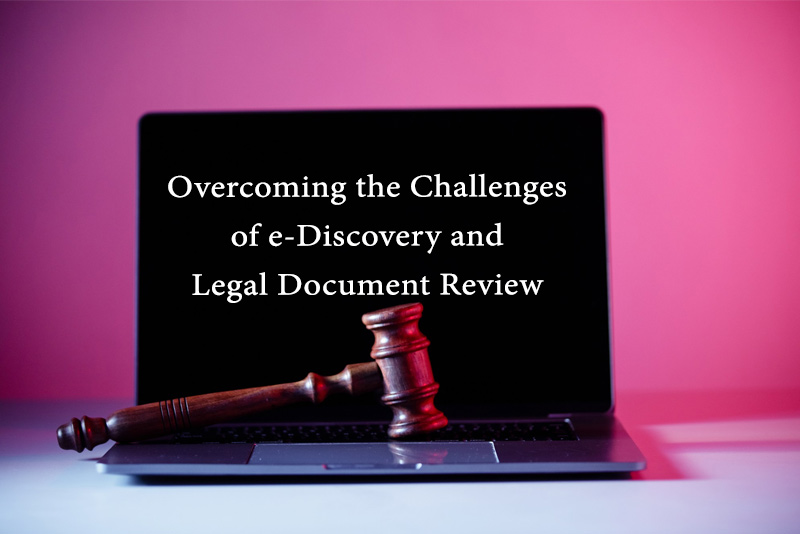Legal document review is one of the important services provided by legal process outsourcing companies. Sorting through and analyzing the documents and data pertaining to a case to get key information and determining which elements are sensitive, relevant and privileged is complex, tedious, and time consuming. However, this critical process is essential to determine what documents must be withheld from disclosure to the opposing counsel and what documents should be disclosed.
Challenges in Managing Legal Document Review
- Need For a Qualified Legal Document Review Team: Finding qualified document review lawyers and paralegals to meet the needs of the law firm can be a challenge. Several core skills are needed to analyze complex legal information, ranging from legal know-how and subject matter expertise to foreign language fluency and understanding of quality control. The rising demand for skilled reviewers has pushed up costs.
- Large Volumes Of Unstructured Material: In the past, document review or the discovery process was about going through stacks of paper records. Today, legal document review involves electronic information which is intangible and voluminous and is usually supplemented by metadata which can become an important part of the evidence and argument building. In addition to structured material such as text messages, documents, spreadsheets, there are large amounts of unstructured material as social media photos, CCTV footage, texts, emails and voice mails, videos and video calls, tweets, and much more. This electronically stored information (ESI) – subject to federal and state laws – may prove to be very valuable to building a given case. However, the massive volume of ESI that needs to be reviewed makes the review process extremely challenging for attorneys to manage.
- Confidentiality Of Privileged Documents: In the document review process, documents are categorized into two: responsive and non-responsive documents. Upon Request for Production (RFP), responsive documents are reviewed to identify confidential or privileged documents. For instance, any communication between the attorney and client relating to the case are considered privileged documents. These documents will not be produced when RFP is filed. Document review also involves determining if documents should be wholly or partially redacted to protect the content from disclosure. Responsive documents that contain any sensitive information about the case will be labeled confidential. The challenge is that law firms need to have proper infrastructure and security measures in place to ensure the integrity of the document review process.
Outsourcing for High-Quality Document Review
Proper handling and review of electronically stored information will support a smooth litigation process. With all the challenges involved in the eDiscovery and document review process, law firms prefer to outsource these tasks. Outsourcing eDiscovery and document review can help law firms overcome the challenges involved in the document review process. Having the task handled by a legal process outsourcing company with a skilled and experienced litigation team would not only ensure efficiency but also prove economically beneficial. Leading companies can handle work related to many areas such as general litigation, corporate and commercial law, and more. Going by document review best practices helps document review service providers ensure provide consistent results.
- Clear Idea about Project Goals: Clarity about the end-goal for the document review is important to determine the workflows that needs to be setup by the legal team.
- Planning: This involves identifying the documents relevant to the case at hand and which will meet the discovery goal, with privileged documents set apart. Documents that need particular attention due to their relevance to the case or will be of interest to the opposing counsel are identified, so that the law firm can prepare an appropriate response.
- Number of Documents to be Reviewed, Level of Review Needed, and the Time Limit: The service provider will assess the volume of data to be reviewed as well as the level of analysis required – first level review, second level review, QC review, and so on.They will also discuss the time available for completing the review. This is important to determine the size of the team to handle the project and for timely completion.
- Quality Control: Results will be validated using stringent quality control processes. Targeted review will be performed to detect any errors, identify material that needs further review, and set apart all privileged documents.
Outsourcing e-discovery and document review is less expensive than hiring an on-site team. With experts on the job at all levels, they can also deliver results in faster turnaround time. Importantly, legal process outsourcing reduces work pressure on lawyers and their teams and allows them to focus on their legal strategy and other core tasks.




